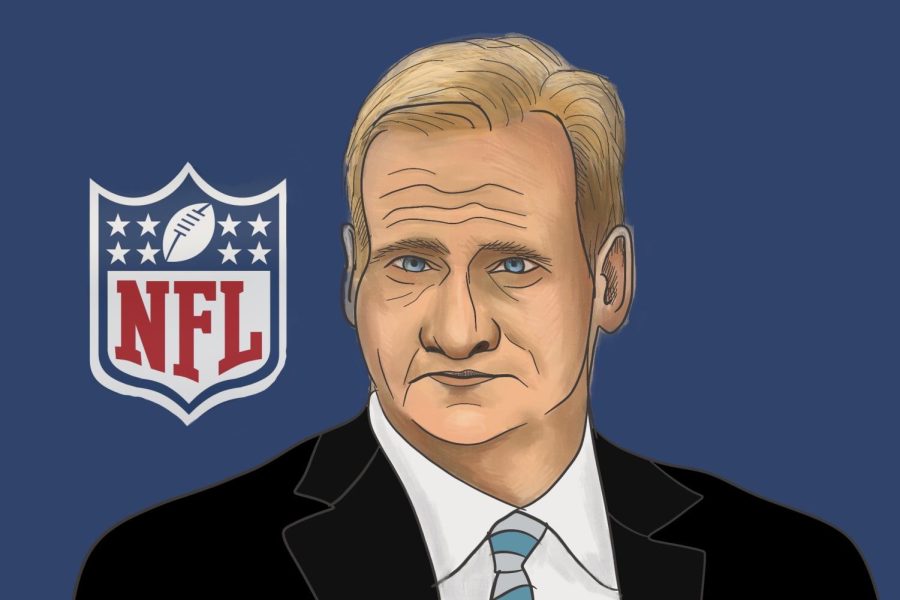The NFL has a culture problem
NFL fails to proactively punish sexual assault

Under Roger Goodell’s watch, the NFL has been criticized for a lack of severe punishments in response to instances of sexual assult committed by players.
September 1, 2022
Trigger warning: this article discusses cases on sexual assault and may be triggering to some readers
Forty-four. That is the number of active NFL players who were accused of sexual assault or domestic violence during the 2017 season, according to Odyssey.
That number is almost enough to fill up an entire roster of players with allegations brought against them. Players are able to have these problems and accusations ignored for the sake of their athletic ability and the NFL’s commissioner and owners would rather employ someone who has talent than attempt to create an inclusive culture and have a set of morals.
Sexual assault and domestic violence are not the only controversies that create a negative culture surrounding the NFL, college football and even high school football. Problems such as cheating scandals, offensive and culturally appropriating logos, racist team owners and a lack of protection from head injuries or proper handling of head injuries create a negative atmosphere around the NFL.
However, the most relevant issue at this current time is sexual assault due to two major cases regarding one of the best quarterbacks in the league and a rookie punter with the nickname of the “punt god.”
The QB, Deshaun Watson, had 24 civil lawsuits alleged against him from different women accusing him of sexual misconduct during and following massages in Texas. Watson only received an 11-game suspension for these allegations that will be over in enough time to allow him to play against his former team, the Houston Texans. Furthermore, the original suspension length was only six games. To get it to 11 games it took a lengthy discussion between the NFL and the NFL Players Association.
The length of the suspension is problematic because it shows that they care more about the revenue they can make from his return against his former team than the women’s stories about what he had done to them.
It was also a very light suspension in comparison to something that could be considered a far less problematic cultural issue such as betting on your team to win.
That is what happened with Calvin Ridley of the Atlanta Falcons, who was suspended 16 games for betting a total of $1,500 during a five-day period when he was not actively playing for the team, according to the NFL.
The other recent massive sexual assault case involves former Buffalo Bills punter Matt Araiza. Araiza, an alum of San Diego State University, was recently sued along with two of his former SDSU teammates in a gang rape accusation. The Buffalo Bills subsequently cut their sixth-round draft pick after backlash from the public on social media and other online platforms.
However, according to journal entries that have been released by the victim’s attorney Dan Gilleon, the victim went to police the day after the assault had taken place. If this were to be true, then it would be incredibly difficult to believe that the Bills and other NFL teams would be unaware of the accusations when determining whether or not they wanted to draft Araiza.
It can be reasonably deduced that the Bills’ management would have never drafted Araiza in the first place, cut the punter or had a problem with him in the locker room if the allegations had not become a major talking point of social media. Their decision to cut him comes down to a PR concern and not one that they had desired to do to create a better culture surrounding the team.
Many sexual assault allegations, such as Araiza’s, come from college football. WSU is not exempt from this trend. In 2005, a backup running back by the name of Kevin McCall pleaded guilty to a fourth-degree assault charge with sexual motivation that landed him a 45-day jail sentence, according to ESPN.
In 2018, Jason Gesser, former Cougar QB and then WSU assistant athletic director, resigned from his position with the school due to sexual misconduct allegations.
These two instances are not in a vacuum, as many other college campuses have experienced multiple allegations against players, coaches and other employees of their respective football teams, notable schools being Baylor University and University of Florida, which have each had large-scale sexual assault scandals within the last decade.
At any level, the rate of allegations and lack of repercussions that come out of these instances is alarming. In the case of the NFL, with the reputation as a professional sports league and the age of the players, it is especially disturbing.
Overall, the NFL, through their compliance with the employment of players with one or multiple sexual assault or domestic violence allegations against them, as well as lenient suspension penalties when they decide to suspend the players fosters a toxic culture surrounding the sport that only acts to either feel indifferent to or even encourage their players to behave this way off of the field.
It is time and has been time for a change in the culture of the NFL and American Football as a whole.









